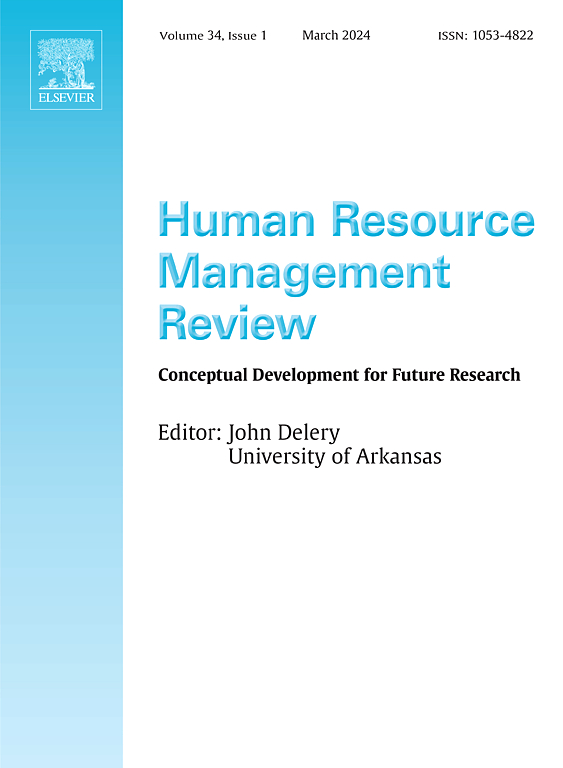Re-focusing talent management: Frontline and essential work as the contemporary challenge
IF 13
1区 管理学
Q1 MANAGEMENT
引用次数: 0
Abstract
Talent Management (TM) research has predominantly focused on graduated knowledge workers and high potentials who are identified and nurtured as future talent for key positions. In the global context, societal phenomena and megatrends challenge main paradigms of exclusive approaches in TM, especially which target groups are scarce and require special consideration of HRM practitioners. Taking a phenomenon-based approach, this paper discusses the relevance of demographic shifts, educational policies, migration, and the rapid development of AI, indicating different labor markets for the future. We explore Frontline and Essential Workers (FEWs) as a potential source of talent and organizational capabilities in diverse national contexts, exemplified in the German economy. Key implications for the future of TM are identified and a more future-orientated, inclusive framework suggested, inviting further development and scholarly discussions.
重新聚焦人才管理:作为当代挑战的一线基础性工作
人才管理(TM)的研究主要集中在毕业的知识工作者和高潜力的人身上,他们被确定并培养为未来关键职位的人才。在全球背景下,社会现象和大趋势挑战了TM中排他方法的主要范式,特别是目标群体稀缺,需要人力资源管理从业者的特殊考虑。本文采用基于现象的方法,讨论了人口变化、教育政策、移民和人工智能的快速发展之间的相关性,并指出了未来不同的劳动力市场。我们探讨了一线和关键工人(FEWs)作为不同国家背景下人才和组织能力的潜在来源,以德国经济为例。确定了TM未来的关键含义,并提出了一个更面向未来、更具包容性的框架,邀请进一步的发展和学术讨论。
本文章由计算机程序翻译,如有差异,请以英文原文为准。
求助全文
约1分钟内获得全文
求助全文
来源期刊

Human Resource Management Review
MANAGEMENT-
CiteScore
20.20
自引率
7.00%
发文量
0
审稿时长
48 days
期刊介绍:
The Human Resource Management Review (HRMR) is a quarterly academic journal dedicated to publishing scholarly conceptual and theoretical articles in the field of human resource management and related disciplines such as industrial/organizational psychology, human capital, labor relations, and organizational behavior. HRMR encourages manuscripts that address micro-, macro-, or multi-level phenomena concerning the function and processes of human resource management. The journal publishes articles that offer fresh insights to inspire future theory development and empirical research. Critical evaluations of existing concepts, theories, models, and frameworks are also encouraged, as well as quantitative meta-analytical reviews that contribute to conceptual and theoretical understanding.
Subject areas appropriate for HRMR include (but are not limited to) Strategic Human Resource Management, International Human Resource Management, the nature and role of the human resource function in organizations, any specific Human Resource function or activity (e.g., Job Analysis, Job Design, Workforce Planning, Recruitment, Selection and Placement, Performance and Talent Management, Reward Systems, Training, Development, Careers, Safety and Health, Diversity, Fairness, Discrimination, Employment Law, Employee Relations, Labor Relations, Workforce Metrics, HR Analytics, HRM and Technology, Social issues and HRM, Separation and Retention), topics that influence or are influenced by human resource management activities (e.g., Climate, Culture, Change, Leadership and Power, Groups and Teams, Employee Attitudes and Behavior, Individual, team, and/or Organizational Performance), and HRM Research Methods.
 求助内容:
求助内容: 应助结果提醒方式:
应助结果提醒方式:


